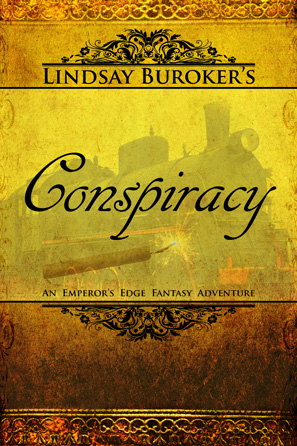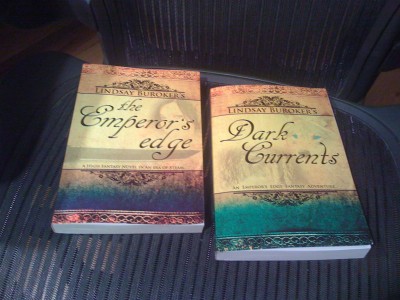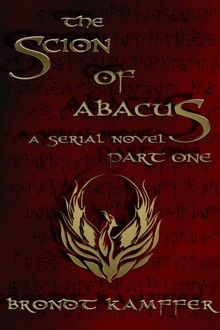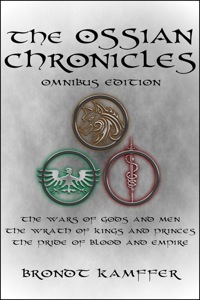 Those of you who follow me on Twitter or Facebook know that I just sent EE4 off to my editor for proofreading and any final tweaks she may find. She said she’d be able to start working on it in a couple of days, and I’m hoping for a May 1 release date.
Those of you who follow me on Twitter or Facebook know that I just sent EE4 off to my editor for proofreading and any final tweaks she may find. She said she’d be able to start working on it in a couple of days, and I’m hoping for a May 1 release date.
Here’s an excerpt for those who like little teasers. As usual, Amaranthe has talked Sicarius into exploring something fishy…
Excerpt
Amaranthe withdrew a tin of matches and a compact, nearly indestructible lantern. She lit the wick, and a soft bubble of light came to life, throwing Books’s shadow against the canvas covered cargo bed of the closest lorry. Sicarius had already disappeared into a rough square hole that descended… Amaranthe frowned and lowered the light. She couldn’t see him or the bottom.
“How far down is it?” she whispered into the hole.
“No more than fifteen feet,” came Sicarius’s voice in return, echoing softly in the narrow space.
“Ah, not so bad then.”
“So long as there aren’t booby traps, monsters, and nefarious men with guns down below,” Books said, a curl to his lip as he regarded the drop.
“Why don’t you stay here and stand guard?” Amaranthe suggested.
“Excellent idea.”
“Better not light the other lantern,” Amaranthe said as she swung onto the ladder. They didn’t need anyone noticing a flame in the carriage house and investigating.
“Understood,” Books said.
As Amaranthe descended, the dark, narrow hole imparted a feeling of claustrophobia. If she hadn’t left her rucksack up top, she might have gotten stuck in the tight passage. If this was indeed an underground manufacturing facility, the owners must have another, larger exit they used for toting out the big weapons.
Before her boots hit the ground, Amaranthe bumped into an obstruction. She reached out and found a head of short soft hair that was, as usual, sticking out in myriad directions.
“Problem?” Amaranthe asked.
“I haven’t been able to determine how to open the door,” Sicarius said without commenting on her groping hand.
“What? With me and Books up there blathering for so long, I thought you’d have picked the lock and vanquished whatever guard might lie within.”
“There is no lock.” Sicarius responded in his usual monotone, with no hint that he appreciated her teasing or knew it for what it was.
Business, right. Amaranthe squeezed past Sicarius to find the bottom. They could stand shoulder-to-shoulder, looking at the door opposite of the ladder, but not without pressing against the walls and each other.
“Not quite as cozy as the Imperial Gardens, eh?” Amaranthe murmured, not wanting Books to hear.
Sicarius ignored her and probed around the door with his fingers.
Under the light of the lantern, Amaranthe decided “door” might be an optimistic term for the flat cement wall before them. Vertical cracks at the corners were the only indication that the gray slab might be movable. It seemed to be designed to slide to the side somehow, but there was no lock, knob, or latch to be seen.
She put a hand on the cool cement and tried to push it. Not only did it not move, but Sicarius gave her a flat look.
“You already tried that, eh?” Amaranthe shrugged and shuffled in a circle to face the ladder. She tried twisting the rungs—they were the only ornamentation in the confining space—but nothing budged.
After a pat-down of everything around the door and on the floor, Sicarius reached over her head and climbed up the ladder.
“That man never wants to linger in dark nooks with me,” Amaranthe muttered. “Or explain where he’s going when he rushes off. It’s enough to damage a girl’s self-esteem. And cause her to start talking to herself.”
Up top, Books asked a soft question, but Sicarius didn’t explain anything to him either.
Left alone, Amaranthe reapplied herself to the task of finding a latch or trigger. She would love to locate one when Sicarius had failed to, but she wouldn’t hold her breath waiting for that to happen.
Amaranthe laid an ear against the cement, thinking she might hear some machinery ticking inside. The Imperial Barracks had doors controlled by steam engines that opened automatically when someone approached. One didn’t expect such sophistication from the basement of a farm’s carriage house, but maybe—
The door rumbled to the side.
Amaranthe skittered backward, clunking her shoulders on the ladder. Her first silly thought was that her ear had somehow triggered the door to open, but Sicarius soon reappeared.
“There’s a hoe on the wall that opens it,” he said, climbing down.
“Ah, how’d you find it so quickly?” Amaranthe told herself it wasn’t important that he’d located the trigger first. “There must be fifty farm tools hanging on the walls.”
“Closer to a hundred, but only one had all the sawdust worn away beneath it.”
“You saw which one he pulled, Books?” Amaranthe called up as Sicarius slipped past her, stepping onto a dark threshold.
“Yes,” Books said.
Sicarius removed his rucksack and withdrew a lantern of his own.
“If the door closes behind us,” Amaranthe said, “and we’re not out in fifteen minutes, open it again, please.”
“Yes, of course. Understood.”
Amaranthe followed Sicarius inside. He had only gone a couple of steps. His lit lantern rested on the floor while he crouched beside it, eying the room’s contents thoroughly before moving forward. When Amaranthe looked around herself, she decided “room” was a weak word to describe what stretched before them.
The small flame illuminated only their corner of the space, but it revealed rows of racks filled with rifles, shotguns, and other firearms Amaranthe couldn’t name. The underground chamber’s boundaries stretched well beyond the walls of the carriage house above. Beyond the rows of racks, at the far end of the rectangular space, dark blocky shapes—machinery?—loomed. Bland gray cement comprised the walls, floor, and a high ceiling, and Amaranthe decided no woman had been involved with designing the facility. It would take someone like Sicarius to choose such a monochromatic palate. He probably thought it was practical.
The door rasped behind them, cement rubbing against cement as it slid closed. Amaranthe stifled a surge of panic over the idea of being trapped inside. There ought to be a switch on a nearby wall—surely the workers had to be able to leave to pee whenever they wished—and, even if there wasn’t, Books waited up top.
“Shall we explore?” Amaranthe asked.
Sicarius rose from his crouch, but when she started to step forward, he stopped her with a hand. He pointed to the wall a couple of feet ahead of them. At first, Amaranthe saw nothing, but when he lifted the lantern, she spotted a tiny hole in the cement. It didn’t appear unnatural in the porous wall, until she realized there were five such holes, all in a vertical line. The first was at calf level while the top was over her head.
“Interesting,” Amaranthe said. “Booby trap?”
She drew a knife and waved it before one of the holes, figuring anything that popped out would be deflected by her blade.
A click sounded and shapes buzzed through Amaranthe’s field of vision. Before she could figure out what they were, Sicarius pulled her back and pressed her against the door behind him. Several items clinked off the walls and floors, but with her view smothered by Sicarius’s shoulder, it was hard to tell what they were. She did, with the projectiles bouncing off everything and skidding everywhere, belatedly realize that triggering the trap hadn’t been a good idea.
Sicarius stepped away before Amaranthe’s curiosity prompted her to try and wriggle past him. He gave her a head-to-foot check before kneeling to pick something up. A tiny bolt. Others lay scattered where they had landed after caroming off the walls. Something viscous gleamed on the tips. Poison?
Amaranthe swallowed. “Booby trap number one?”
“Yes. That was a foolish way to trigger it.” Sicarius slanted her a hard look.
“I know.” She thought of the conversation she had had a few months earlier with Books, the one where she had resolved to pursue prudence in dealing with enemies. She would need to adopt a policy of prudence for all deadly situations, enemies present or not. “Sorry, that was thoughtless.” Especially since one could have hit him.
Sicarius dropped the bolt, and Amaranthe patted his shoulder. “I do appreciate your willingness to throw yourself in front of ricocheting darts to protect me.”
Sicarius ignored her pat and turned his attention back to the chamber.
“And your ability to ignore the human need to socialize in order to remain focused on the mission,” Amaranthe added.
“This is not the time for burbling.”
A retort rose to Amaranthe’s lips, but she stopped herself. He was right.
After another inspection of the booby trap, Sicarius moved past it. He led the way down the first aisle, heading for a work table full of sketches. As he walked, his gaze roved about, probing every inch of wall, floor, and ceiling for signs of more traps. Though Amaranthe wanted to investigate the racks of weapons, she followed close on his heels. If he triggered a booby trap, he could probably avoid the consequences with those reflexes of his. She would likely trip and fall into the path of the poisoned dart.
When they reached the work station, Sicarius picked up a rifle with four barrels and examined it. Amaranthe’s fingers strayed toward the sketches scattered on the table, but she caught herself before her hands could rearrange the clutter into neat piles. As the men were quick to tell her, spies weren’t supposed to clean while they snooped.
Sicarius set the rife aside and pulled a crate off one of the racks. He slid his black dagger under a lid that was nailed shut. Using it as a crowbar was not likely to damage that blade. Amaranthe was still waiting for the story of where it had come from and what the indestructible material comprising it was.
Sicarius popped the lid off the crate. It was filled with rectangular brown boxes that read Brakhork D-1 Rifle Ammunition.
“Brakhork?” Amaranthe fished a notebook out of her pocket and wrote the name down. “That’s interesting. You wouldn’t expect someone to put the family name on something that’s going to be used for inimical purposes. Of course, it could simply be a made-up name.”
When Sicarius glanced at her, Amaranthe said, “I’m not burbling. I’m musing constructively.”
“I see.”
She tried to decide if he sounded amused while he opened one of the boxes and pulled out a long slender cartridge wrapped in a coppery casing. It had a pointed tip and three concentric rings circling the bottom.
Sicarius thumbed the rings. “I’ve not seen a design like this before.”
“How many designs have you seen?”
“Many. Everything the army’s been working on for the last ten years,” Sicarius said. “They’ve had the technology to make repeating firearms, and there have been experimental trials, but they haven’t rushed to get production online.”
“Why not, I wonder? Surely, these repeating firearms offer significant advantages over flintlock and percussion-cap weapons.” Amaranthe found a rifle labeled D-1 and pulled it off the rack. She opened the lid on the side and peered into an empty chamber, guessing there would be room to load six or eight cartridges.
“With most of our enemies still using bows and crossbows, our existing black powder weapons already provide an advantage.”
“So, they’ve been waiting to upgrade until there’s a need?” Amaranthe asked.
“There’s also the warrior-caste mentality to deal with.”
“Ah, yes. Turgonian honor dictates it’s preferable to challenge the enemy to a sword fight rather than shooting him from afar.” She slipped a finger into the chamber, trying to figure out what roll those grooves at the base of the bullet might serve. “Want to disassemble a rifle?”
She checked the desk for tools, but it seemed to be the designer’s spot, and only sketches and drawing implements occupied the drawers. Sicarius took the weapon from her and simply used his knife to unfasten a couple of screws. He proceeded to remove the stock from the barrel and disassemble the loading mechanism, as if he’d done it hundreds of times.
“How are you familiar with all of the army’s weapons developments from the last ten years?” Amaranthe asked. “Didn’t you part ways with the throne when Raumesys died? And then worked as an independent without any ties to the emperor? In fact, Sespian put that bounty on your head before he even came into legal power, right?”
Sicarius laid the pieces of the rifle out on the desk as he continued to break it down.
“For the record, I’m still not burbling. I’m just…”
“Interrogating?” Sicarius suggested.
“Maybe so, but I’m not using hot irons or other torture devices, so it shouldn’t be objectionable.” Amaranthe wriggled her eyebrows at him, though he was focused on the rifle disasembly. “If nothing else, you could tell me why you chose to assassinate a satrap governor and other important lords and diplomats when you were out there working for the highest bidder. You must have known that would give Sespian more reason to hate and distrust you.”
Sicarius laid the last pieces of the rifle on the table. “This isn’t the place for this discussion.”
“No, I suppose not, but if I’m to help argue your case when we meet Sespian—which, if things go according to plan, will be soon— I need more of the facts at some point. Or at least, your version of the truth.”
His eyes narrowed slightly. Maybe that hadn’t been the most tactful word choice. Before she could fumble an apology, Sicarius said, “They were plotting against Sespian.”
“What? Who?”
“Satrap Governor Lumous, Lord Admiral Antavak, the city officials, diplomats, and two warrior-caste officers. Lumous and Antavak headed a scheme to have Sespian assassinated the year after Raumesys died, before he’d even reached his majority and come into power. I killed them first.” Sicarius picked up the bolt and firing pin assembly to study. “It’s what I was trained to do. In reflection, perhaps I should have gathered evidence, so there’d be some record. Something to show to Sespian.”
Amaranthe stared at him with wide eyes. “All along you were acting on his behalf? Trying to protect him?”
“The fact that he has no heirs has always made him a target. You know that.”
“Yes, but I thought… I guess everyone thought you were just a rogue assassin available to hire by the highest bidder.”
Sicarius gave her one of his flat looks.
“I mean, I knew it wasn’t money that drew you,” Amaranthe said. He’d had little money when she met him—just enough to hire that shaman to heal her—and he certainly didn’t seem to have any vices that would require substantial funds. He didn’t even own more than three sets of clothing, all identical. “I thought perhaps you might be motivated by the challenge factor.”
“Rarely.”
“Sicarius, this changes everything. Your methods trample all over the idea of justice and having a fair say in front of the magistrate, but all this time you were working to help Sespian? For the good of the empire? You’re practically a hero.” She grinned at him, and, blessed ancestors, she was tempted to hug him.
Sicarius snorted. “The empire is nothing to me. If Sespian were some deviant crime lord, I’d still kill those who meant him harm.”
His words failed to steal Amaranthe’s grin. “It’s all right. I won’t tell the world you’re not quite the malevolent butcher everyone thinks.”
He looked like he might glare or otherwise object to this softening of his image, but he caught himself. Instead, he said, “Just tell one person.”
“I will.” Amaranthe took the rifle’s bolt from him and studied the interior. By the poor light of the lantern, it was hard to see inside, but she thought she detected raised bumps to fit the groves in the cartridge. It seemed like an odd addition from a functionality standpoint. Why not simply keep the bullet smooth? Wouldn’t it have better aerodynamics that way? Then something clicked in her brain. “It’s a proprietary design, isn’t it?”
“What?”
Amaranthe waved to the racks of weapons and crates of ammunition. “If they made all the rifles the same way as this one, then only these particular cartridges will work in them. No smith could simply reproduce these. It’d take a sophisticated facility like this one to duplicate the design. So, the buyers of these weapons will have to continue to order ammunition from the sellers for life.” She picked up one of the bullets and rubbed it between her fingers. “Maybe this is a Forge plot after all. That seems like the sort of quasi-shady business practice one of their people might try.”
Three thumps came from behind and above them.
“Books,” Amaranthe said. “Someone must be coming.”
Sicarius started toward the door, but Amaranthe caught his arm. “Wait, you have to put the rifle back together. We don’t want anyone to know we were here. Especially not if there’s a link to Forge.”
“I opened a crate,” Sicarius said, but he returned to the table and started assembling.
“Maybe they won’t notice that right away.”
While he worked on the weapon, Amaranthe slipped a handful of the cartridges into her pocket. Being able to show someone the unique bullets later might prove useful. She tucked the ammo box back into the crate, trying to hide the fact that it had been opened, and affixed the lid. She manhandled the crate back onto the rack.
Ker-thunk!
“Uhm.” Amaranthe lifted her eyes toward the ceiling. That had been much louder than the earlier thumps, and if she had to guess where the sound had originated, she’d say above them and outside of the carriage house. “I don’t think that was Books.”
Sicarius finished reassembling the rifle and returned it to the rack. He jogged toward the door, pausing briefly to test the booby trap and make sure it had not reset.
Amaranthe waved to the cement slab. “Can we open it from in here?”
Sicarius patted about the walls, but he didn’t find a lever.
“Maybe the hoe is the only way in.” Amaranthe thought about knocking on the door, but if Books hadn’t caused that second noise, she didn’t want to alert whoever had to their presence.
A long scrape grated at the rear of the chamber, in the dark back half they had not yet explored. Tendrils of unease curled through Amaranthe’s belly. That noise hadn’t come from above. Something was down there with them.
Maybe someone already knew about their presence.
Soft whirs and clanks emanated from the darkness. A grinding followed, and Amaranthe thought it sounded like wheels or treads rolling over the cement floor.
“Oh, good, it’s been a while since I’ve been chased by a machine. It ought to be good training, right?” Amaranthe smiled.
Sicarius did not.

 Those of you who follow me
Those of you who follow me  I’ve never been terribly social online (unless slaying dragons was involved — ex-Everquest/WoW addict here, yes), so I didn’t flock to the social media sites when they first started getting popular.
I’ve never been terribly social online (unless slaying dragons was involved — ex-Everquest/WoW addict here, yes), so I didn’t flock to the social media sites when they first started getting popular. I was dragged kicking and screaming onto Facebook. I only made a personal account because some buddies I took a trip with held our group pictures hostage (they put them on Facebook and made it so only “friends” could see them). The punks. I made an account, but wasn’t on there much, and it wasn’t until last August that I
I was dragged kicking and screaming onto Facebook. I only made a personal account because some buddies I took a trip with held our group pictures hostage (they put them on Facebook and made it so only “friends” could see them). The punks. I made an account, but wasn’t on there much, and it wasn’t until last August that I 




